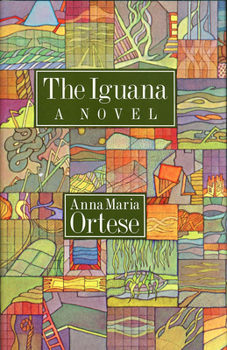L'Iguana
Select Format
Select Condition 
Book Overview
In this magical novel a Milanese count stumbles upon a desolate community of lost noblemen on an uncharted island off the coast of Portugal. When he discovers, to his utter amazement, that their... This description may be from another edition of this product.
Format:Paperback
Language:English
ISBN:0914232959
ISBN13:9780914232957
Release Date:October 1987
Publisher:McPherson
Length:198 Pages
Weight:0.65 lbs.
Dimensions:0.6" x 5.7" x 8.5"
Customer Reviews
2 ratings
Humanity's fall from grace between reality, dream and lunacy
Published by Thriftbooks.com User , 21 years ago
Born in Rome in the year 1914, Anna Maria Ortese grew up in southern Italy (primarily Naples) and in Lybia, the fifth of nine children of a soldier's family often short on money. Like many poor girls of her generation, Ortese left school at age thirteen, initially with the idea of studying (and then, teaching) music in mind; until the discovery of literary romanticism, particularly the writings of Edgar Allan Poe and Katherine Mansfield, and her need for creative self-expression made her turn to writing. She eventually studied with Massimo Bontempelli, proponent of the "magical realism" she herself would soon make her own as well, and in 1937 published her first collection of short stories, entitled "Angelici Dolori." Yet, although her work has garnered her native Italy's most prestigious literary prizes (most notably, the 1953 Premio Viareggio for the collection of stories "Il Mare non Bagna Napoli" - published in English under the title "The Bay Is Not Naples" - and the 1967 Premio Strega 1967 for the novel "Poveri e Semplici"), few of her books have been translated into English; and even in Italy, she has remained controversial despite all literary acclaim. "The Iguana" is generally considered Ortese's masterpiece, winner of the 1986 Premio Fiuggi upon its republication, 21 years after its original release. It tells the story of the Milanese count Daddo (Aleardo di Grees), who goes on a somewhat lackluster voyage of discovery and, off the Portuguese coast, comes upon an uncharted island named (as his captain tells him) Ocana, and inhabited by three impoverished noblemen - the brothers Avaredo-Guzman - and their servant Estrellita. While attempting to strike up a friendship with the dreamy don Ilario de Guzman, don Aleardo also finds himself strangely attracted to the humble Estrellita, who, he discovers much to his shock and surprise, is not a human being but an iguana in human clothes. Initially a mere observer of the goings-on on the island, Daddo's interest in don Ilario and Estrellita draws him, vortex-like, more and more into a participatory role; and as the narrative shifts between dreamlike sequences, reality and a growing sense of lunacy, drawn in, like don Aleardo, is also the reader. Unfortunately I am not fluent enough in Italian to be able to read the book in its original version; I am told that it is written almost entirely in the imperfect tense (imperfetto) which, inter alia, describes events in an undefined or remote past, and thus probably contributes even more to the novel's unreal, almost otherworldly feeling. Yet, even in translated form, it is abundantly clear that "The Iguana" deserves every bit of praise it has received (the leading Italian Newspaper "Corriere della Sera" even hailed it as "one of the very few books destined to redeem the honor of Italian literature since the Second World War"); it is a wonderfully-written voyage into, as Ortese herself described her literary aim, "the regions of the soul where
When you need something cerebral
Published by Thriftbooks.com User , 24 years ago
The Iguana is not easy bedside reading, to be sure. I picked this up not knowing what it was and was immediately hooked. It took me longer to figure out what I was reading and I'm not sure I understand it all yet, but it made me think. The characters are surely unique. Syntax can bog you down, but I think it's worth the work. I'm eager to read her newest...






